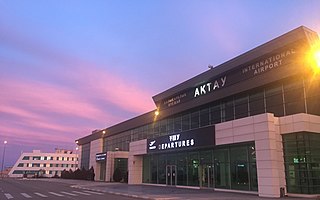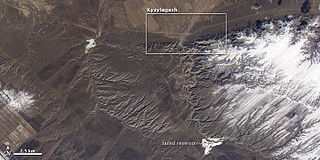Contents
| |||||
| Decades: | |||||
|---|---|---|---|---|---|
| See also: | |||||
Events in the year 2024 in Kazakhstan.
| |||||
| Decades: | |||||
|---|---|---|---|---|---|
| See also: | |||||
Events in the year 2024 in Kazakhstan.
| Photo | Post | Name |
|---|---|---|
 | Chairman of the Security Council of Kazakhstan | Kassym-Jomart Tokayev |
| President of Kazakhstan | ||
 | Prime Minister of Kazakhstan | Älihan Smaiylov (until 5 February) |
 | Roman Sklyar (until 6 February) | |
 | Oljas Bektenov (since 6 February) | |
Source: [8]

Kazakhstan, officially the Republic of Kazakhstan, is a landlocked country primarily in Central Asia, with a small portion situated in Eastern Europe. It borders Russia to the north and west, China to the east, Kyrgyzstan to the southeast, Uzbekistan to the south, and Turkmenistan to the southwest, with a coastline along the Caspian Sea. Its capital is Astana, while the largest city and leading cultural and commercial hub is Almaty.

The economy of Kazakhstan is the largest in Central Asia in both absolute and per capita terms. As of 2023, Kazakhstan attracted more than US$370 billion of foreign investments since becoming an independent republic after the dissolution of the former Soviet Union.

Kazakhstan's approach to foreign relations is multifaceted and strategic, reflecting the country's unique geopolitical position, historical context, and economic ambitions. At the heart of its international diplomacy is a multivector foreign policy, which aims to maintain balanced and diverse relations with all major global powers and regional neighbours. Kazakhstan is a member of the United Nations, Collective Security Treaty Organization, Organization for Security and Co-operation in Europe, North Atlantic Cooperation Council, Commonwealth of Independent States, the Shanghai Cooperation Organisation, and NATO's Partnership for Peace program. Kazakhstan established a customs union with Russia and Belarus which eventually became the Eurasian Economic Union. President Nazarbayev has prioritized economic diplomacy into Kazakhstan's foreign policy.

2022 (MMXXII) was a common year starting on Saturday of the Gregorian calendar, the 2022nd year of the Common Era (CE) and Anno Domini (AD) designations, the 22nd year of the 3rd millennium and the 21st century, and the 3rd year of the 2020s decade.

2024 (MMXXIV) is the current year, and is a leap year starting on Monday of the Gregorian calendar, the 2024th year of the Common Era (CE) and Anno Domini (AD) designations, the 24th year of the 3rd millennium and the 21st century, and the 5th year of the 2020s decade.

Kassym-Jomart Kemeluly Tokayev is a Kazakh politician and diplomat who has served as the President of Kazakhstan since March 20, 2019.

Azerbaijan Airlines, also known as AZAL, is the flag carrier and largest airline of the country of Azerbaijan. Based in Baku, adjacent to Heydar Aliyev International Airport, the carrier operates to destinations across Asia, the CIS, and Europe. Azerbaijan Airlines is a member of the International Air Transport Association.

Aktau International Airport, formerly Shevchenko-Central, is an international airport in Mangystau Region, Kazakhstan. It is the primary international airport serving the city of Aktau. The airport is the eighth-busiest international air passenger gateway into Central Asia, the 50th-busiest airport in the post-Soviet states, and the fourth-busiest airport in Kazakhstan.

Kazakhstan–Russia relations are the bilateral foreign relations between Kazakhstan and the Russian Federation. Kazakhstan has an embassy in Moscow, a consulate-general in Saint Petersburg, Astrakhan, and Omsk. Russia has an embassy in Astana and consulates in Almaty and Oral.

Foreign relations exist between Azerbaijan and Kazakhstan. Azerbaijan has an embassy in Astana and a consulate in Aktau. Kazakhstan has an embassy in Baku.

The Kyzyl-Agash Dam failure, occurred in a dam located outside the village of Kyzyl-Agash, Jetisu Region, Kazakhstan. On 11 March 2010, the dam burst, flooding the village. At least 43 people were killed, 211 people were injured, and over 1000 evacuated from the village.

The Zhanaozen massacre took place in Kazakhstan's western Mangystau Region over the weekend of 16–17 December 2011. At least 14 protestors were killed by police in the oil town of Zhanaozen as they clashed with police on the country's Independence Day, with unrest spreading to other towns in the oil-rich oblys, or region. According to Amnesty International, the massacre was a stark illustration of the country's poor human rights record under President Nursultan Nazarbayev.

Aktau is a city in south-west Kazakhstan, on the eastern shore of the Caspian Sea. Its name, 'white mountain' in Kazakh, may be due to its cliffs that overlook the Caspian. From 1964 to 1991, the city was named Shevchenko, after the Ukrainian poet Taras Shevchenko who was exiled near there. Aktau is on the Mangyshlak Peninsula in the Mangystau Region.

The Kazakh Naval Forces is the naval force responsible for coastal defense, naval special warfare, and naval warfare branch of the Armed Forces of the Republic of Kazakhstan. The navy mainly operates on the Caspian Sea and is currently based in the coastal city of Aktau.
Events of 2019 in Kazakhstan.

Kuandyk Bishimbayev is a former Kazakh politician who served as Minister of National Economy of Kazakhstan from 6 May 2016 to 28 December 2016. In November 2023, he was charged with the murder of his wife Saltanat Nukenova and a widely-publicized televised trial started in March 2024. He was convicted in May 2024 and sentenced to prison for 24 years.

There have been attacks in mainland Russia as a result of the Russian invasion of Ukraine, which began on 24 February 2022. The main targets have been the military, the arms industry and the oil industry. Many of the attacks have been drone strikes, firebombing, and rail sabotage. The Ukrainian intelligence services have acknowledged carrying out some of these attacks. Others have been carried out by anti-war activists in Russia. There have also been cross-border shelling, missile strikes, and covert raids from Ukraine, mainly in Belgorod, Kursk, and Bryansk oblasts. Several times, Ukrainian-based paramilitaries launched incursions into Russia, captured border villages and battled the Russian military. These were carried out by units made up mainly of Russian emigrants. While Ukraine supported these ground incursions, it denied direct involvement.
Events in the year 2024 in Russia.
This is a list of individuals and events related to Azerbaijan in 2024. In the Republic of Azerbaijan, 2024 was ordered the "Year of Solidarity for the Green World" by the Presidential order.

Azerbaijan Airlines Flight 8243 was a scheduled international passenger flight from Heydar Aliyev International Airport in Baku, Azerbaijan, to Kadyrov Grozny International Airport near Grozny, Russia. On 25 December 2024, the Embraer 190AR operating the flight was severely damaged by what is believed to be an anti-aircraft missile during the aircraft's approach to Grozny. The aircraft attempted to divert but ultimately crashed near Aktau International Airport in Kazakhstan with 62 passengers and 5 crew on board. Of those 67 people, 38 died in the accident, including both of the pilots and a flight attendant, while 29 people survived with injuries.